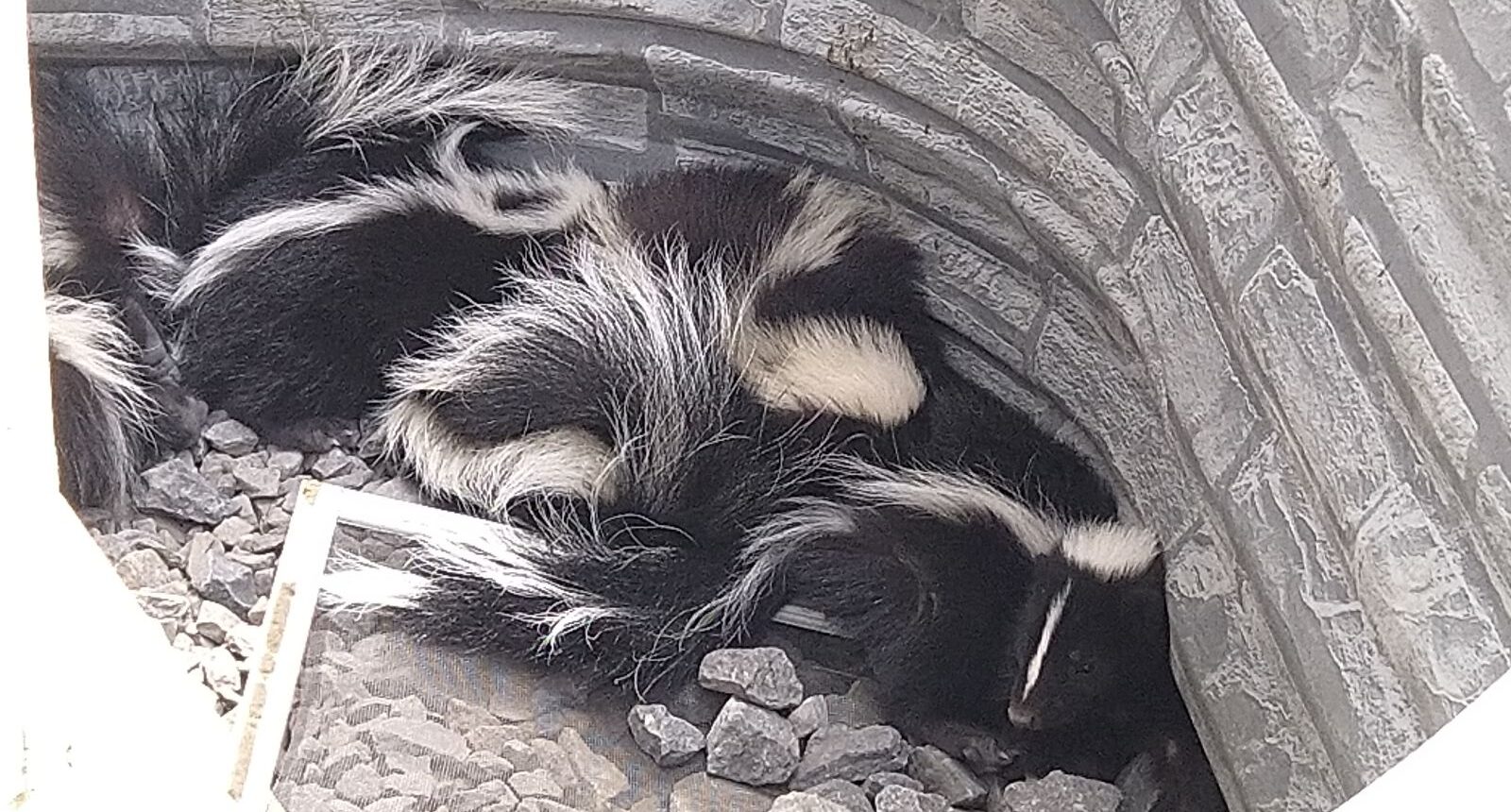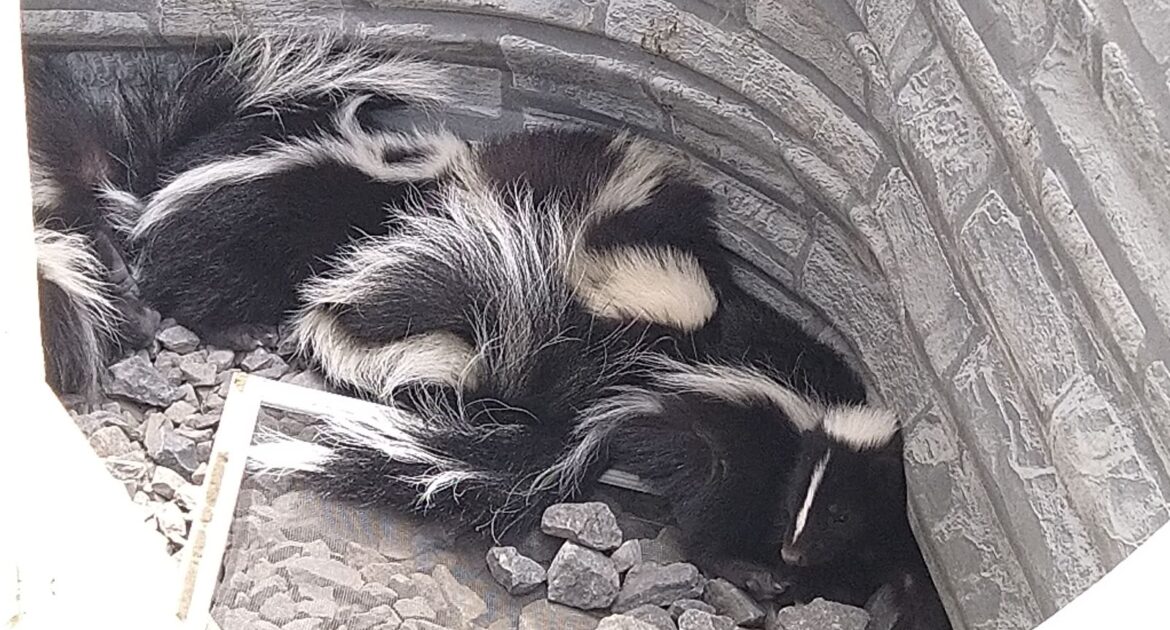It’s not uncommon for homeowners in Reynoldsburg to encounter skunks in their yards, especially as warm weather arrives. Understanding skunk defense tactics can help you avoid unwanted interactions and take precautions to safeguard your home. From the infamous spray to other clever behaviors, learning how these animals protect themselves reveals their fascinating survival methods while giving homeowners useful insights to manage their activity effectively.
Below, we explore their defense mechanisms, what makes them effective, and how to address a potential skunk presence on your property safely and humanely.
Skunk Spray And Defense
The skunk’s spray is undoubtedly its most infamous defense mechanism, but it’s also one of the most misunderstood. They rely on this potent chemical weapon as a last resort, not a first response. The spray is a sulfur-based liquid produced in glands located beneath their tails. With the ability to spray accurately up to 10 feet, this defense not only deters predators but also leaves a lasting mark—literally and figuratively.
Before resorting to spraying, skunks exhibit warning behaviors to ward off perceived threats without releasing the liquid. These behaviors include:
- Stomping their feet: A clear sign of agitation and warning.
- Hissing or growling: Audible signals designed to intimidate.
- Raising their tail: A signal that the skunk is prepared to defend itself.
Interestingly, skunks avoid spraying unless absolutely necessary. This is because producing the spray uses significant energy, and it takes time to replenish their supply. If you suspect a skunk is near, recognizing these warning signs is key to avoiding unpleasant encounters.
For homeowners, skunk spray can be a major inconvenience. Its smell can cling to surfaces, clothing, and pets for weeks. If your pet gets sprayed, mixing a solution of hydrogen peroxide, baking soda, and liquid detergent can help neutralize the odor. However, prevention is critical—knowing how to identify skunk activity can help you manage the situation before it escalates.
How Skunks Protect Themselves
Skunks have honed a variety of defense mechanisms beyond their spray, tailored to reduce conflict and ensure their survival. These behaviors are highly effective whether they’re dealing with natural predators like coyotes or curious pets.
Besides spray, skunks also protect themselves by exploiting their natural features and instincts:
- Their unique coloration: The black-and-white stripes act as a bold warning. Many predators know to steer clear because the pattern is associated with unpleasant experiences.
- Nocturnal behavior: By foraging and moving around at night when predators are less active, skunks lower their risk of danger.
- Den-seeking expertise: Skunks are skilled diggers, creating dens beneath sheds, porches, and decks. These dens provide secure shelter from predators and harsh weather.
Understanding these survival strategies can help you take precautionary steps, like securing potential entry points around your property to discourage skunks from digging. Preventative efforts are particularly important during spring, when mother skunks look for safe places to raise their young.
Skunk Defense Tactics And Your Home
When skunks seek refuge around homes, their defense tactics can create unpleasant situations for homeowners. Typical indicators of skunk activity include small holes in your lawn where they dig for grubs, or dirt piles near structures like sheds and porches. You might also catch their unmistakable scent—a sign they’re too close for comfort.
Dealing with skunks properly requires a calm and measured approach. It’s crucial to avoid triggering their defensive behavior. If you discover a skunk near or under your structure, refrain from attempting DIY solutions. Skunks are not aggressive animals, but an improperly handled situation can lead to spraying or injury.
At Skedaddle, we focus on humane removal techniques. Our trained technicians understand how to safely address skunk activity without causing stress to the animal—or you. Preventative measures like installing barriers and locating entry points protect your property and minimize the chance of future skunk visits.
How Skunks Protect Themselves Without Spraying
One key aspect of skunks’ defense system is their preference for non-spray tactics. Skunks are resourceful animals that rely on various strategies to avoid confrontation. Spraying is always the last resort because of the effort it takes to replenish the chemical liquid. Instead, they:
- Rely on body language and behavior: Stomping, growling, and raising their tail often scare away predators and prevent the need to spray.
- Adapt to their environment: Skunks are opportunistic feeders and will adjust their behavior to stay out of harm’s way. For instance, they may scavenge during specific times to avoid encounters with larger animals.
- Leverage natural hiding spots: From their dens to dense vegetation, skunks instinctively find safe areas that make them less visible to predators.
Their emphasis on non-aggressive, energy-efficient tactics makes them an interesting model of survival. For homeowners, this behavior highlights the importance of avoiding actions that might threaten or corner a skunk, as it eliminates their less confrontational options and increases the likelihood of a spray.
Skunk-Prevention Tips For Homeowners
Preventing skunk activity before it starts is the best way to avoid the stress and inconvenience of their presence. Here are actionable tips to keep skunks away from your property:
- Secure trash bins: Use heavy-duty bins with tight-fitting lids to prevent skunks from scavenging.
- Remove food sources: Bring in pet food and clean up fallen fruit from trees to reduce attractants.
- Seal potential dens: Install mesh barriers around decks, porches, and sheds. Bury barriers 8–12 inches deep to prevent digging.
- Maintain your lawn: Skunks are drawn to grubs and insects in your grass. Regular lawn care can make your yard less appealing.
- Reduce clutter: Remove woodpiles, brush, and other debris that could provide shelter.
By following these preventive measures, you can make your property less attractive to skunks while supporting wildlife management efforts by encouraging them to thrive in less disruptive areas.
Skedaddle’s Skunk Removal Services in Reynoldsburg
At Skedaddle, we understand the challenges and concerns that arise when skunks are found on your property. That’s why our professional skunk removal services are designed to deliver reliable, humane, and efficient solutions tailored to your specific needs. Our team of experts uses tested and effective techniques to ensure skunks are removed safely, without causing harm to the animals or disrupting your home.
We begin by thoroughly inspecting your property to identify entry points and denning sites, allowing us to address the problem at its source. Each situation is approached with care and customization to ensure the best possible outcome. Once the skunks are safely removed, we seal potential access points to prevent future intrusions, providing long-term protection for your home. Additionally, we offer practical guidance to help make your property less attractive to skunks, promoting harmony between your home and local wildlife.
With over 30 years of experience in humane wildlife control, we are a trusted choice for skunk removal services. Our commitment to customer satisfaction and environmentally responsible practices sets us apart, giving homeowners peace of mind in knowing their property is in expert hands.
Know Who To Call For Humane Solutions
Understanding how skunks protect themselves gives us a deeper appreciation for these unique animals while helping us manage our interactions with them more thoughtfully. If you encounter skunks on your property in Reynoldsburg, whether it’s around Blacklick Woods or closer to your backyard, we’re here to help.
At Skedaddle, our humane approach ensures the skunks are safely removed, your property is protected, and your family can enjoy peace of mind. Don’t wait for a close encounter—call us today to address skunk activity before it causes damage or discomfort. Trust our expertise to keep you and your home skunk-free.




